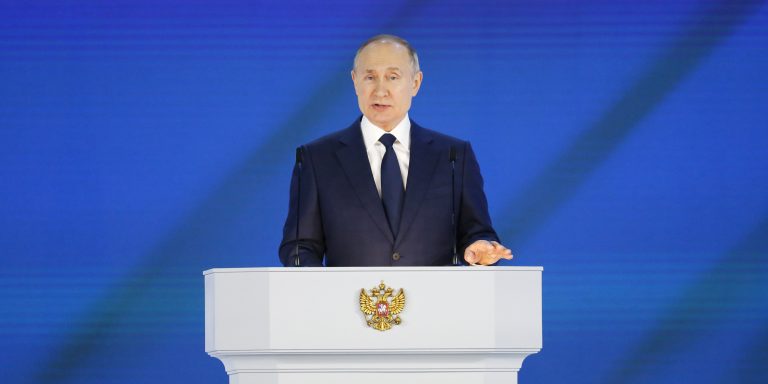INTELBRIEF
April 28, 2021
IntelBrief: Putin Speech Bolsters Russia’s Image Abroad, Downplays Challenges At Home

Bottom Line Up Front
- In a speech last week, Russian President Vladimir Putin crafted the image of a resolute Russia pushing back against an encroaching West.
- His speech highlighted “spiritual and moral values” and attempted to depict the West as inferior, while sidestepping Russia’s domestic issues.
- Putin’s focus on Russia’s nuclear arsenal was intended to remind the international community of Moscow’s still potent military capabilities.
- Russia’s desire to be viewed as a great power is, however, undermined by rogue actions abroad and brutal repression at home.
As Russian President Vladimir Putin faces increasing domestic unrest related to the imprisonment of opposition figure and activist Alexei Navalny, he is redirecting citizens’ attention to international issues and Russia’s place in world affairs. In a speech to the country last week, Putin crafted the image of a powerful and resolute Russia pushing back against an encroaching West; the speech promised a “quick and tough” response if Russia’s adversaries dare to “cross the red line in respect to Russia,” the familiar sound of saber-rattling in the background. Several parts of the speech were a clear rebuke of the Biden administration; Russia has chafed at the latest round of U.S.-imposed sanctions and took issue with U.S. commentary on the Russian troop buildup along the Ukrainian border.
Wary of being seen as an “also ran,” Putin has projected Russia’s position to be on par with the United States and China, as the three nations maneuver for position in a reprise of great power competition. However, international relations and global politics have often been framed as a contest for hegemony between Washington and Beijing; Moscow has sometimes been excluded from the conversation altogether. Russia is often described as “revanchist,” still powerful but in decline and overly reliant on energy resources to maintain its economy. The tone of Putin’s speech sought to offset this and reaffirm his promise to restore Russia to greatness. This objective has led Moscow to grow more active abroad, deploying troops or mercenaries to several conflict zones and seeking to increase Russia’s influence from Latin America to the Levant. Russian involvement in Syria, Ukraine, Libya, Venezuela, and various countries in sub-Saharan Africa has expanded Moscow’s global footprint. Russia has deployed limited military and financial resources to several conflicts and proxy wars and consequently, has become a critical stakeholder in their resolution. Russia has additionally moved to significantly expand its presence and activities in the Arctic region. Also noteworthy from Putin’s speech was the attention to detail when describing Russia’s nuclear arsenal, a stark reminder of Russia’s military power.
The speech highlighted Russia's supposed “spiritual and moral values” and attempted to depict the West as inferior. Tensions remain high between Russia and the United States. Russian election meddling and continued cyberattacks, along with a mounting troop presence along the border in Ukraine, are all issues the Biden administration has pledged to tackle head on. Recently enacted sanctions are in direct response to the Solar Winds hack that Washington blames on Moscow. After four years of a largely supplicant Trump administration, Putin will once again be held accountable for Russian adventurism abroad. The White House and the Kremlin are reportedly in talks to schedule a summit between President Joseph Biden and Putin. There are areas where the U.S. and Russia have to work together. For example, there has been some progress with the New Strategic Arms Reduction Treaty, and Russia agreed to join the climate summit at the White House. But Russia is also increasingly working with other great powers. Warming relations with China and growing cooperation between Moscow and Beijing in several geopolitically important regions, particularly during a diplomatic and strategic vacuum over the past four years, poses a direct challenge to the United States.
To some, Putin’s speech was an effort to redirect Russians’ attention away from the litany of domestic issues and challenges facing the country. Like many other world leaders, including former U.S. President Donald Trump, Brazilian President Jair Bolsonaro, and Indian Prime Minister Narendra Modi, Putin’s handling of the coronavirus pandemic was disastrous. The Russian government lacks transparency, so while official figures are unknown, a recent article in the New York Times suggested that the death rate in Russia could be among the highest per capita in the world. Domestically, Moscow is over reliant on energy resources to sustain its economy, and health and demographic indicators remain highly unfavorable. Despite Russian aspirations to great power status and influence, it continues to behave as a rogue state, sending intelligence agents abroad as hit squads to assassinate the Kremlin’s enemies on foreign soil with lethal nerve agents. But deflecting attention away from domestic challenges may not work for much longer, as evidenced by recent protests in support of Navalny, who in an act of remarkable courage returned to Russia from Germany, where he was recovering after being poisoned by Russian intelligence officers using a chemical nerve agent. His recent hunger strike prompted a wave of statements from the U.S. and allies about Russia’s obligations to safeguard his life and health, as well as left supporters watching carefully for signs of improvement and rallying to his support despite enormous risk. Putin is paranoid about being undermined by the West, but it may be his own myopic approach to quelling internal dissent that eventually leads Russia to a descent into instability.